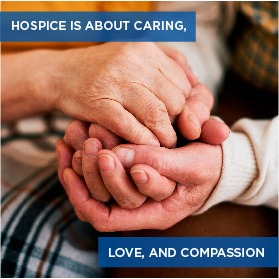
inpatient/outpatient services
When a patient can no longer be cared for at home, patients may enter a hospital , nursing home or other in-patient facility such as the Community Hospice House. In an in-patient facility, the hospital staff and hospice team are actively engaged in aiding the patient and providing around-the-clock care. General inpatient care for hospice patients is monitored closely by Medicare, Medicaid and other insurance providers to minimize hospital stays. Because every patient is different, the length of stay and potential discharge is based on the patient’s end-of-life progression.
Nursing Care:
A registered nurse or a licensed practical nurse provides nursing care under the supervision of a nurse supervisor.
Physician Services:
The Hospice Medical Director oversees the patient’s medical care working closely with the entire hospice team and the patient’s regular physician.
Certified Nursing Assistants (Personal Care Services):
Certified Nursing Assistants (CNAs) provide personal hygiene services, such as bathing and grooming that maintain a safe and sanitary environment in areas of the home used by our patients.
Social Workers:
Our medical social workers have special training in hospice care and offer information, support and counseling for patients, families and significant others through phone calls or home visits.
Spiritual Services:
Chaplains provide nondenominational spiritual services to patients and family members to meet the individual’s wishes and varied cultural and religious needs.
Bereavement Services:
The loss of a loved one is a life-altering experience, especially in the first year after death. Bon Secours is committed to supporting your family as you grieve and learn new ways to thrive. Because it can be helpful to connect with others who have had similar experiences, our counselors offer grief materials by mail, memorial services, Mother’s Day, Father’s Day and holiday services, workshops, support groups and individual counseling. Click here to learn more.
Hearing Impaired and Translation Services:
Bon Secours provides a telecommunications device for the deaf (TDD) and CyraCom translation/interpreter services for our patients and family members.
Medications:
Medications related to the patient’s hospice diagnosis are usually provided at no cost as part of the patient’s Medicare/Medicaid Hospice Benefit or as determined by private insurance.
Volunteer Services:
Hospice volunteers are a vital part of the Hospice Care Team and serve as helping hands, companions and sympathetic listeners. They assist with patients and family care, as well as community outreach, education and office/clerical support. They also serve as speakers and educators and help with special events. No experience is needed, and training is provided. For more information, click here or call 804-264-7387.
Speakers and Education:
Speakers are provided for community groups to learn more about Bon Secours Hospice and other Bon Secours programs and services. Please visit our Calendar of Events for information on lectures, educational and fundraising events.
Pet Peace of Mind Program:
This program, the only one of its kind in Central Virginia, provides pet food, veterinary services and other pet care needs at no cost to our hospice care patients, as well as assistance with rehoming a pet should the need arise. With this kind and compassionate support, patients are able to complete their end-of-life journey without worrying about their pet’s current or future needs. For more information, please call Ellen Manning at 804-264-7387.
Our Hospice staff can also offer:
- Information resources – financial, insurance and legal matters; help in arranging hired caregivers; information on pre-planning funeral arrangements
- Support and counseling – family meetings; counseling for patients and caregivers, couples, children and families; bereavement counseling and support groups
- Education/teaching – relaxation and stress management methods to reduce anxiety or depression, and to help control pain and nausea
- Advocacy – ensuring that our patient’s wishes are heard, that patients and families have choices in their care and that they are aware of their right to refuse treatment
Contracted Services
Dietary Counseling:
Dietary counseling may be provided both for the purpose of training the individual’s family or other caregiver about appropriate nutrition and/or for helping the patient adjust to their specific nutritional needs and changes.
Short-term Inpatient Care:
Short-term inpatient care may be provided in a participating hospice inpatient unit, a participating hospital, assisted living or nursing center, or a freestanding hospice facility such as the Community Hospice House. General inpatient care may be required for procedures necessary for pain control, or acute and chronic symptom management that cannot be provided in home settings. Inpatient care may also be provided as respite for the individual family or others caring for the individual at home.
Durable Medical Equipment and Supplies, Including Drugs & Biologicals:
Durable medical equipment, as well as other self-help and personal comfort items related to the palliation or management of the patient’s terminal illness, is usually covered by Medicare, Medicaid and private insurance. Medical supplies include those that are part of the patient’s written hospice care plan.
Rehabilitation Services:
Rehabilitation services may include physical and occupational therapies and speech language pathology services that are used for the purpose of symptom control and safe transfers.
